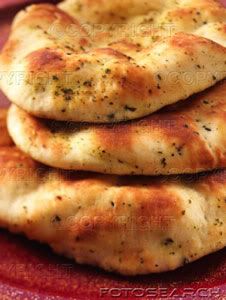 The priests pulled back the covering cloth (what do we call that, it's not a table cloth) and looked at each other with a puzzled look. I saw that it took a little extra effort to tear the bread, luckily it was a long sacrament hymn. One friend quickly identified me as behind the unusual choice in sacramental representation. I saw a few more interesting looks but didn't hear any vocal reactions.
The priests pulled back the covering cloth (what do we call that, it's not a table cloth) and looked at each other with a puzzled look. I saw that it took a little extra effort to tear the bread, luckily it was a long sacrament hymn. One friend quickly identified me as behind the unusual choice in sacramental representation. I saw a few more interesting looks but didn't hear any vocal reactions.I think it's good to mix things up every once and a while to point out the differences in cultural practice and doctrine. Is there any reason the LDS sacrament bread should be sliced wheat bread? No. Should LDS missionaries insist that congregations use sliced wheat bread even if it means having to buy expensive bread from the one store that caters to Americans? (I've seen it) No. What about countries where bread is not a staple food? What should they use for the sacrament?
The doctrine or principal-- Doctrine & Covenants 27, "it mattereth not what ye shall eat or what ye shall drink when ye partake of the sacrament, if it so be that ye do it with an eye single to my glory."
A few other tidbits about the LDS sacrament--
"Individual water cups, instead of drinking from a common cup, were introduced in 1911. This followed a growing trend among American churches which began with the Congregational church in 1893." Wikipedia
"Passing the sacrament first to the presiding church authority was emphasized in 1946." Wikipedia
Being a public health graduate I can understand the practice of the first but nobody should get ruffled feathers if circumstances were such that you had to share the cup. In fact I think there is some added beauty in symbolic terms of sharing the cup. There is also less waste with one cup. I wonder which is more environmentally friendly, the current plastic cups or the old paper cups. I would love to see the church move to something like biodegradable corn starch cups or something along those lines.
The passing of the sacrament to the presiding church authority is pure culture, done, I believe, out of respect and honor for the office but I don't know of any doctrinal precedence. I think the practice can lead to some false understandings and false honoring of status or position. I personally would love to see the practice changed to portray greater egalitarianism. I think it would be great to see the bishop occasionally pass the sacrament. Growing up, whenever there was a fifth Sunday in a month, the Elders and High Priests in my ward would pass the sacrament and I liked seeing that humility.
Last point-- in 3rd Nephi chapter 18 when Christ introduces the sacrament to the Nephites it appears that they ate until they were full and I believe quite literally in this case that they ate until their appetites were full and satisfied. I would love to do that one Sunday, especially if the sacrament item was my grandmother's famous rolls.


8 comments:
One of my most memorable experiences with the sacrament was when I was hiking the Inca trail with some friends and our trek went onto a Sunday. We had to pocket some bread from our breakfast and find a somewhat empty water bottle that we could fill with enough water for each of us to pass around for a sacramental sip. Somehow having to procure our own materials for the sacrament made the sacrament prayers mean all that much more. It's true: it doesn't really matter what we use. That being said, while I didn't object at all to the use of the pitas yesterday (it actually wasn't surprising, especially since we had cinnamon bread the week before), there are times when "mixing it up" just for the sake of mixing it up can cause a disturbance that can disrupt the reverence of the ceremony, thus potentially taking the focus off of what is the most important part of our meeting, our week even (we are human after all and by nature quite easily distracted). I agree that there are times to raise awareness, to teach missionaries and members alike that it is not necessary to force western tradition on non-western Mormon congregations when doctrinally it doesn't matter or isn't specified (whether in written scripture or by direction of the leaders). I just think we need to be careful about how and when (and why) we do it.
I also agree that it is nice to see the older men of the ward bless and pass the sacrament. This wasn't a rare occurrance in my ward, as we usually only had about four or five Aaronic priesthood holders at a time, but it was always heart-warming to see our Stake Patriarch participate in passing the sacrament to the congregation.
I'm sure this will prove to be an interesting blog. I look forward to reading more of your pot-stirring thoughts. :)
I would say that passing to the presiding priesthood member first has been instituted as an unwritten order of things. As he is in charge of the meeting, he also is in charge of ordinances performed therein. Thus his accepting of the sacrament first shows that the ordinance has been performed correctly.
About your last comment- I ate at grandma's last night and she sent me home with two big ziploc bags full of rolls. I'll think of you as I eat them over the next few days or maybe just hours.
Hmmm I'm going to have to agree with Julie on this one. Elder Nelson, Pres. Packer, and Elder Maxwell have directed stake presidents for congregations to use white bread whenever possible, as it indicates a symbol of purity and is a part of the "unwritten order of the church." The "unwritten order of things" obviously doesn't always apply across cultures, but within a certain culture I would argue that it does apply, and that we shouldn't push the envelope on issues that are better left to "a pattern in all things."
I don't think that it's productive to "stir the pot" during an ordinance that, while we often take for granted, is supposed to be a spiritual renewal of covenant. I would hope that we, as members of the church, would give more deference and respect to our ordinances
Dallin H. Oaks has a good article in the New Era about Priesthood responsibility and the Sacrament.
http://www.lds.org/ldsorg/v/index.jsp?vgnextoid=024644f8f206c010VgnVCM1000004d82620aRCRD&locale=0&sourceId=611d19b3fe4fb010VgnVCM1000004d82620a____&hideNav=1)
I think he points out some important things.
"The principle is that those officiating in the sacrament—whether preparing, administering, or passing—should not do anything that would distract any member from his or her worship and renewal of covenants."
"In all their actions they should avoid distracting any member of the congregation from worship and covenant making."
"they should avoid distracting anyone present from full attention to the worship and covenant making that is the purpose of this sacred ordinance."
Some people may not be distracted by various types of breads used in the sacrament, but for many it would be a distraction especially with a sweet or cinnamon bread. I really don't think the point of the sacrament is to fill our bellies... it is to fill our soul with the Spirit.
Well said, everyone. I came away with a much wider perspective. This has the potential to be a great forum. How did you guys find me so fast?
Michael, make sure you bring a bag of rolls for me at the reunion.
I will take the blame/credit for people finding you so fast. I saw the creation of it on my home feed on Facebook and couldn't resist reading. I think it was as simple as a chain reaction of forwarding on something of interest. Looking forward to additional interesting discussions.
This is a completely non-related and probably quasi sacrilegious comment, but I wholeheartedly agree with naan. It is manna from heaven. Although garlic naan on Fast Sunday would create a huge breath problem . . .
Post a Comment